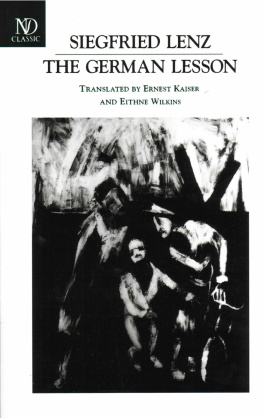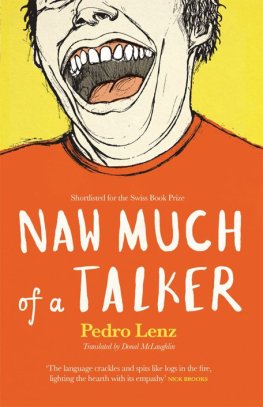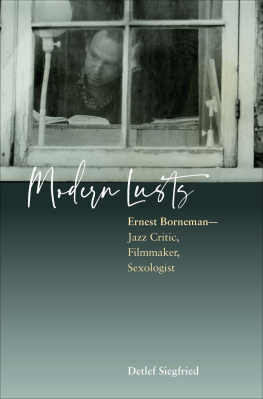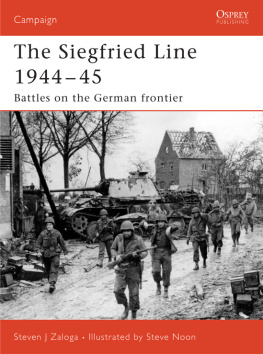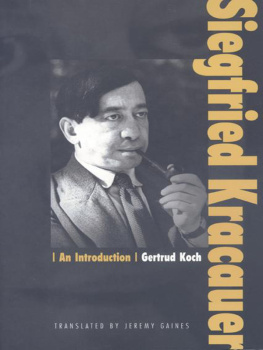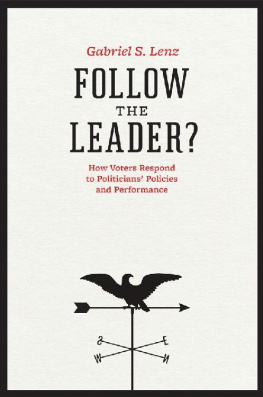Siegfried Lenz - The German Lesson
Here you can read online Siegfried Lenz - The German Lesson full text of the book (entire story) in english for free. Download pdf and epub, get meaning, cover and reviews about this ebook. year: 2013, publisher: New Directions, genre: Detective and thriller. Description of the work, (preface) as well as reviews are available. Best literature library LitArk.com created for fans of good reading and offers a wide selection of genres:
Romance novel
Science fiction
Adventure
Detective
Science
History
Home and family
Prose
Art
Politics
Computer
Non-fiction
Religion
Business
Children
Humor
Choose a favorite category and find really read worthwhile books. Enjoy immersion in the world of imagination, feel the emotions of the characters or learn something new for yourself, make an fascinating discovery.
- Book:The German Lesson
- Author:
- Publisher:New Directions
- Genre:
- Year:2013
- Rating:3 / 5
- Favourites:Add to favourites
- Your mark:
- 60
- 1
- 2
- 3
- 4
- 5
The German Lesson: summary, description and annotation
We offer to read an annotation, description, summary or preface (depends on what the author of the book "The German Lesson" wrote himself). If you haven't found the necessary information about the book — write in the comments, we will try to find it.
The German Lesson — read online for free the complete book (whole text) full work
Below is the text of the book, divided by pages. System saving the place of the last page read, allows you to conveniently read the book "The German Lesson" online for free, without having to search again every time where you left off. Put a bookmark, and you can go to the page where you finished reading at any time.
Font size:
Interval:
Bookmark:

THE GERMAN LESSON
T RANSLATED BY E RNST K AISER AND E ITHNE W ILKINS

For L.H.L.
Theyve kept me in to write an essay. Joswig, our favourite guard, has brought me to this room of mine, with its solid walls, has tapped the bars across my window, given my pallet the once-over, and then searched my metal cupboard and my old hiding-place behind the looking-glass. Silently, silently, with an aggrieved expression, he went on to inspect the table, the stool thats all covered with notches, turned his attention to the outlet in the hand-basin, even gave the window-sill a few inquisitorial knocks, and examined the stove to establish that it was just an ordinary stove. Then he came up to me and, leisurely, passed his hands over my body from shoulders to knees to make sure I had nothing dangerous in my pockets. Then, with a reproachful air, he laid the copybook on my table, the essay copybookthe grey label says: German Essays by Siggi Jepsenand, without saying goodbye, moved towards the door, disappointed, suffering in his goodness. For Joswig, our favourite guard, suffers more profoundly and longer and to more purpose than we ourselves do from the punishments that are occasionally dished out to us.
Not in words, but by the way he locked me in, he demonstrated his grief: listlessly, in fumbling perplexity, his key entered the lock; he hesitated before turning it the first time, stopped again, let the bolt snap open once more, and then swiftly, as though reproving his own indecision, with two abrupt turns he locked it. No less a person than Karl Joswig, a frail, shy man, had locked me in with the essay I had been set.
Though I have now been sitting here nearly all day, I dont know how to start. I simply dont know. When I look out of the window, there, softly reflected in my eyes, the Elbe flows by, a gentle image. When I shut my eyes, it still flows on, heaped with bluish glittering drift-ice. I cant help following the tug that slices out grey patterns with its encrusted bows, I have to watch the river depositing its abundance of ice on our bank, pushing it up the slope, shoving one creaking floe on the other till they reach the dry stubble of the rushes, and leaving them there, forgetting them. With disgust I observe the crows gathering at Stade. They come flapping along from Wedel, from Finkenwerder and from Hahnfer Sand, flying singly, and then, over our island, joining to form a swarm, rise and turn in twisting angular flight, until they yield to a sudden favourable wind that sweeps them on. The knotted willow-branches, glazed and powdered with white rime, distract me, and so do the fence of white wire-netting, the workshops, the warning boards along the shore, the frozen clods in the vegetable plots where in the spring we have to work under our guards watchful eyes. Everything distracts me, even the sun, dimly shining as through a pane of clouded glass, streaking things with long wedge-shaped shadows. Sometimes Im just on the point of starting work, and then of course my attention is caught by the battered landing-stage that hangs out there by its chains. Thats where the squat motor-launch from Hamburg, all glittering brass, lies alongside so that anything up to twelve hundred psychologists, who take a positively morbid interest in juvenile delinquents, can step ashore. I cant avert my eyes when they come along the crooked path leading up from the bank, to be ushered into the blue administration building, where they are made welcome in the usual way, probably warned to be careful, to make their inquiries unobtrusively, until their impatience is yielded to and they are let loose to swarm all over our island, harmlessly, as it were by chance, sidling up to my friends, say to Pelle Kastner, or Eddi Sillus or to hot-tempered Kurt Nickel. Perhaps they take so much interest in us because according to the managements calculations there is an eighty per cent probability that those who have been reformed on our island wont relapse. And if I hadnt been locked in by Joswig to do this essay, theyd certainly be after me too, observing my whole life bit by bit as though with a magnifying-glass, trying to get a scientific picture of me.
But for me the extra German Lesson: Ive got to finish this essay for Herr Doktor Korbjuhn, the haggard German master, who is so easily scared, and Governor Himpel. Such things couldnt happen on Hahnfer Sand, the neighbouring island, down-river towards Twielenfleth Wischhafen, where they also keep juvenile delinquents for their own good. The two islands are very much alike; both are surrounded by the same oil-tarnished water, passed by the same ships, occupied by the same gullsbut on Hahnfer Sand they have no Dr Korbjuhn, they arent made to write essays, these essays that cut-my-throat-and-hope-to-die make most of us downright sick. So, if weve really got to be reformed, most of us would much rather be on Hahnfer Sand, where the ocean-going ships pass first and where the crackling, tattered flame of the refinery is an everlasting salutation to one and all.
On that sister island to ours, they wouldnt have kept me in to write this essay; the things that happen here cant happen over there. Here a haggard fellow, stinking of pomade, could simply come korbjuhning into the classroom, let his eyes roll over us, at once sarcastic and timid, wait for our Good morning, Dr Korbjuhn, sir and then dish out the copybooks for essay writing, without any previous announcement, without so much as a word. Not him! You could see him savouring every bit of it as he stalked up to the blackboard, raised his mean little hand so that his sleeve slipped down to his elbow, revealing an arm so dried up and yellow you might think it was a hundred years old, and then wrote on the blackboard in that crouching, slanting script of his that falls over itself with hypocrisy: The Joys of Duty. I looked around the classroom in alarm: all I saw was bent backs, bewildered faces; a faint hiss ran through the rows of benches, a scraping of feet under them, the desks were blistered by the sighs that dropped on them. Ole Pltz, next to me, moved his fleshy lips, murmuring the words, getting himself ready to produce his convulsions. Charlie Friedlnder, who has quite a gift for turning pale or greenish, in any case for looking so horribly unwell that all the masters would instantly excuse him from all work, had already started his breathing technique; he hadnt discoloured yet, but by that clever dodge of his with his carotid artery he had already produced beads of sweat on his forehead and upper lip. I pulled out my pocket-mirror and, turning it towards the window, I caught a beam of sunlight, which I flashed on the blackboard, startling Dr Korbjuhn so that he turned round and, after taking two strides up to the safety of the dais, ordered us, from on high, to begin. Once more his brittle arm rose into the air and his index finger pointed stiffly, insistently, at the theme: The Joys of Duty. And then, so as not to have to answer questions, he decreed: You may write as you wish, but the essay must be on the joys of duty.
Being kept in like this to write this essay and not being allowed to have visitorsits not fair. What Im being punished for isnt that my memory and my imagination let me down. Im in solitary confinement because, obediently searching for the joys of duty, I suddenly had too much to tell, or at least such a lot that I simply didnt know how to start, however hard I tried. And since what Korbjuhn wanted us to discover, describe and enjoy to the limit, thereby establishing its value, wasnt joy as such, but had to be the joy that duty affords, whom else could I picture but Jens Ole Jepsenhis uniform, his field-glasses, his service bicycle, his rain-cape, his silhouette sailing along the top of the dyke in the everlastingly westerly wind? Dr Korbjuhns admonishing gaze instantly brought him to my mind: in spring, no, in autumn, or perhaps on a bleak wind-blown summer day he pushed his bike along the narrow brick path, and, just as always under the sign saying Rugbll Police Station, raised the back wheel to get the pedal into position for mounting and with two heaves swung himself into the saddle, pedalled along, at first a bit wobbly, billowing in the westerly wind, and rode on, at first some distance in the direction of the main road to Husum, which goes on to Heide and Hamburg. Then he turned off at the peat-bog and, now blown by a side wind, rode along the edge of the mole-grey ditch towards the dyke, as always past the mill that had lost its sails, dismounted after passing the wooden bridge and pushed the bike slantwise up the humpy dyke. Up there, significantly outlined against the empty horizon, he swung himself into the saddle again, sailed off, a solitary sloop under his taut, billowing, almost bursting cape, along the top of the dyke to Bleekenwarf, always to Bleekenwarf, always mindful of his orders. And though the autumn wind might drive clouds big as battleships over the sky of Schleswig-Holstein, my father would be on his way. In the dappled spring, in rain, on murky Sundays, morning and evening, in war and in peace, he would swing himself on to his bike and struggle along the narrow blind-alley of his mission, which never took him anywhere but to Bleekenwarf, always to Bleekenwarf, as it was in the beginning and ever shall be, Amen.
Font size:
Interval:
Bookmark:
Similar books «The German Lesson»
Look at similar books to The German Lesson. We have selected literature similar in name and meaning in the hope of providing readers with more options to find new, interesting, not yet read works.
Discussion, reviews of the book The German Lesson and just readers' own opinions. Leave your comments, write what you think about the work, its meaning or the main characters. Specify what exactly you liked and what you didn't like, and why you think so.

